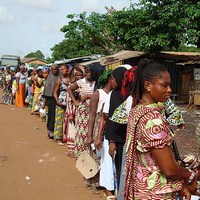A recent series of violent incidents between opposition protesters and security forces in Conakry highlights the challenges impeding Guinea’s political transition since the death in 2008 of Lansana Conte, Guinea’s leader for 24 years. Despite some progress toward stability, the outcome of the transition remains uncertain.
The military coup launching the transition soon mobilized the civilian population into opposition; an unprovoked attack by members of the security forces in September 2009 on a protest rally in a Conakry stadium, including mass rapes, triggered a slow-motion progression toward elections. The maiming of junta leader Dadis Camara by a military rival opened the way to a transitional government that presided over an electoral process kept on course by potentially crippling international economic sanctions.
The multi-party elections of June 2010 were fiercely contested. Cellou Dallein Diallo of the Union of Democratic Forces of Guinea, the leading Foula candidate and a former prime minister under Conte, failed to win a first-round majority, precipitating a second-round victory by longtime political exile Alpha Conde, who assembled an anti-Foula coalition around his Rally of the Guinean People. However, the election of the National Assembly, originally scheduled for 2007, has been repeatedly postponed because of disagreement between the presidency and the largest opposition group, led by Diallo, over the composition of the Independent National Electoral Commission (CENI), management of voter registration and voting rights for the Guinean diaspora.

